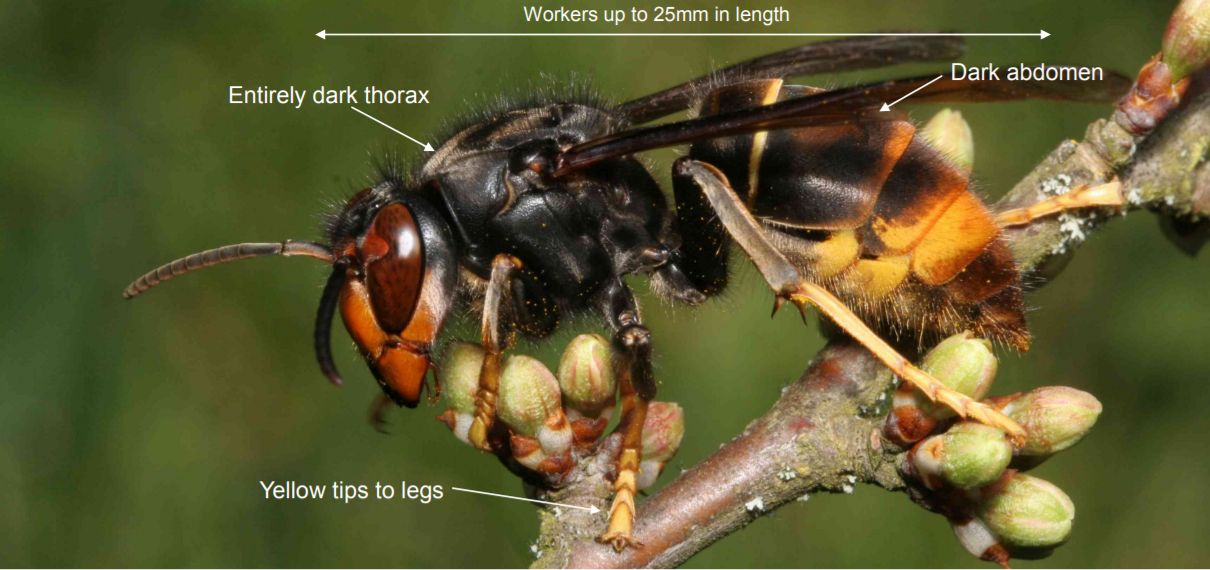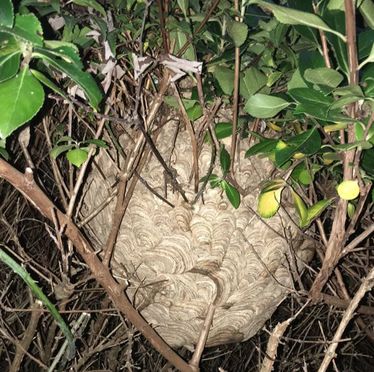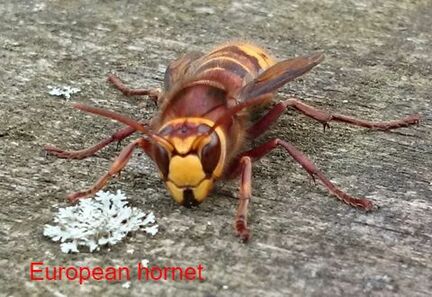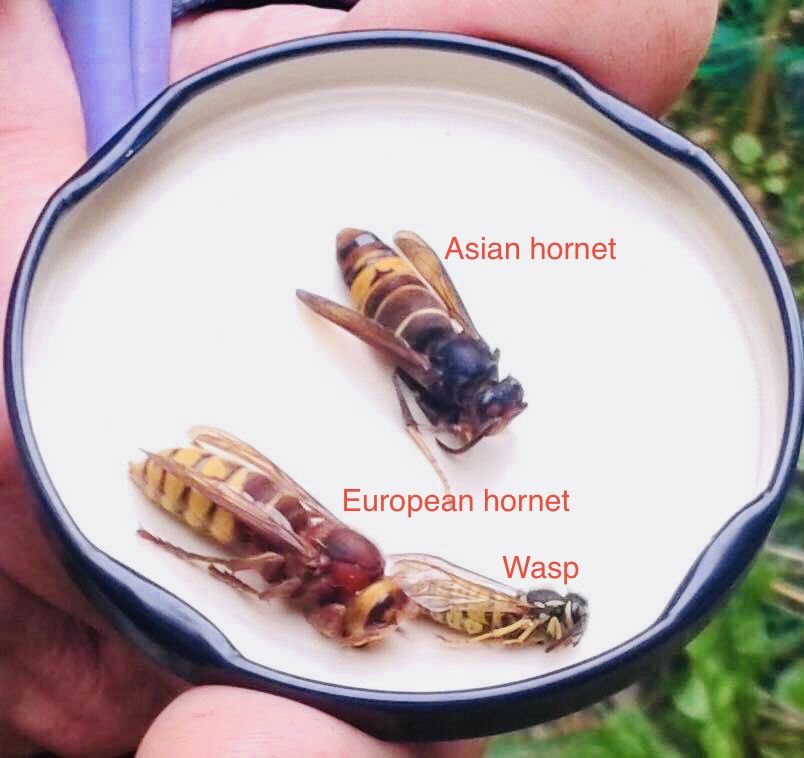Asian hornets (Vespa velutina nigrithorax) cause significant environmental damage and sightings should be reported to the Non-Native Species Secretariat (NNSS) as soon as you can.
What can you do?
Monitor for Asian hornets this Autumn! Check out Somerset's AHAT Coordinator Lynne Ingram's useful guide.
Asian Hornet Watch app for Android
If you spot an Asian hornet
Take some photos and/or capture a specimen and send them to the NNSS for identification; if the sighting is positive, the NNSS will trigger further investigations by our bee inspectors.
SBKA's Asian Hornet Action Team (AHAT) is led by Lynne Ingram. Our AHAT is county-wide comprising of at least one member from each Branch. The full list is below.
Lynne can be contacted on [email protected]
Fera Science has released the following education/training videos:
Asian hornet Biology
Asian hornet Genetics
Images of Asian hornets to download are available on our image gallery.
And we have made the artwork for our Asian hornet resources - banners, leaflets, ID cards & stickers etc available for anyone to use.
- Asian hornets are most active between April and November (peaking in August/September) and are inactive over the winter.
- If they get established in the UK it is predicted they will have a devastating impact on our insect population and ecosystem.
- A number of sightings have been recorded in the UK since the first was spotted in 2016 and we fear numbers will inevitably increase.
- In Jersey, France and large areas of Western Europe they are stripping the environment bare of insects including managed honeybee colonies.
What can you do?
Monitor for Asian hornets this Autumn! Check out Somerset's AHAT Coordinator Lynne Ingram's useful guide.
- Download the Asian hornet app which has photos to assist with identification and can be used to report any sightings:
Asian Hornet Watch app for Android
- Or report using an online form.
- If you have connections with local gardening groups, garden centres, wildlife groups and trusts etc, please spread the word.
- The Non Native Species Secretariat provides a series of resources free of charge including posters and identification sheets which you can distribute to others.
- Our suite of ID resources is available to download for use at beekeeper and public events.
If you spot an Asian hornet
Take some photos and/or capture a specimen and send them to the NNSS for identification; if the sighting is positive, the NNSS will trigger further investigations by our bee inspectors.
SBKA's Asian Hornet Action Team (AHAT) is led by Lynne Ingram. Our AHAT is county-wide comprising of at least one member from each Branch. The full list is below.
Lynne can be contacted on [email protected]
Fera Science has released the following education/training videos:
Asian hornet Biology
Asian hornet Genetics
Images of Asian hornets to download are available on our image gallery.
And we have made the artwork for our Asian hornet resources - banners, leaflets, ID cards & stickers etc available for anyone to use.
branch AHAT Contacts
Branch |
Name |
Phone |
Email |
Burnham |
Thomas O'Neill |
||
Central |
Paul Harper |
||
Exmoor |
Vanessa McDonnell |
||
Frome |
Janet Norman |
||
Mendip |
Cathy Edge |
||
Quantock |
Barry Hulatt |
||
Somerton |
Catherine Fraser |
Value |
|
South East |
Lionel Horler |
||
South West |
Bryan Goodman |
||
Taunton |
Lynne Ingram Vanessa Woodford |
||
Wedmore & Cheddar |
Bridget Knutson Jonathan Friend |
||
Yeovil |
Sharon Blake |
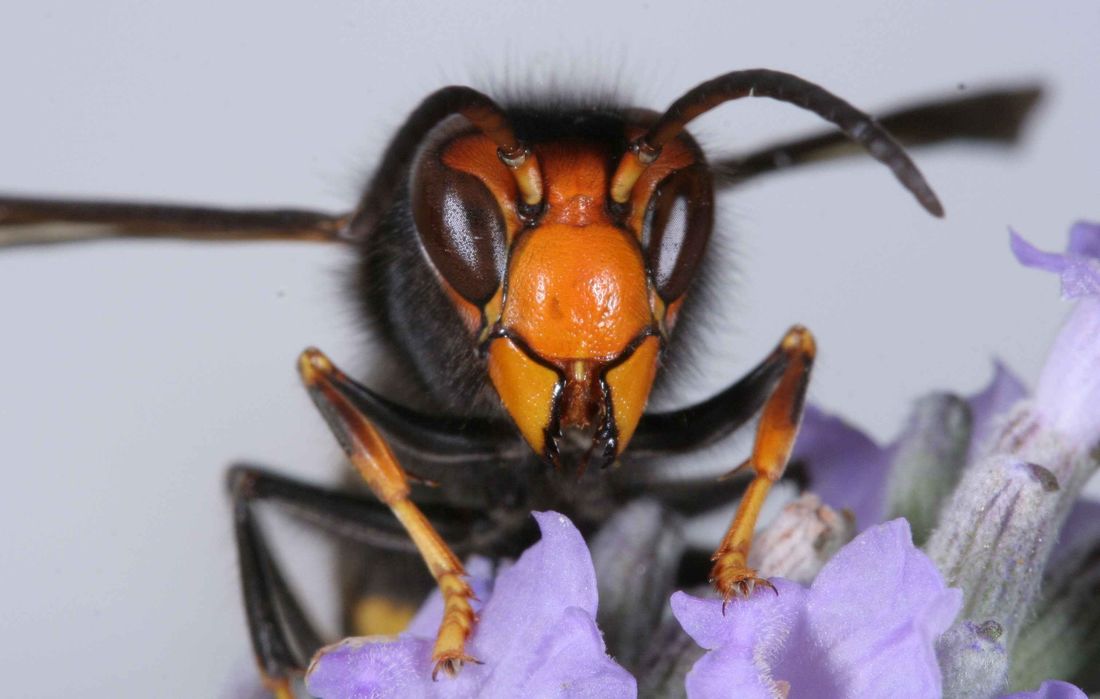 The Asian hornet looks like a large black wasp with a bright orange face. Photo courtesy of Jean Haxaire, The French Natural History Museum The Asian hornet looks like a large black wasp with a bright orange face. Photo courtesy of Jean Haxaire, The French Natural History Museum
What do they look like? Asian hornets are rather like large black wasps with a single yellow band, orange face and yellow tipped legs. Queens are up to 30mm long, workers up to 25mm. Look out for:
Asian hornets are easiest to see around flowers and bee hives in late summer and early autumn. Nests can be high up in deciduous trees, in hedges and in buildings. What are Somerset Beekeepers doing?
|
How to detect Asian hornets
The NBU recommends DIY traps; alternatively traps are available to purchase from beekeeper equipment suppliers. It's recommended that you observe activity carefully around your hives especially in the autumn. The National Bee Unit has added a new feature to BeeBase to help understand UK Asian hornet surveillance. Download the Asian hornet app which has photos to assist with identification and can be used to report any sightings: Asian Hornet Watch app for iPhone Asian Hornet Watch app for Android And, of course, if you spot a nest don't try and destroy it yourself. Alert the authorities! The BBC nationally focused on the threat Asian hornets pose to UK pollinators and ran stories across multiple channels on one day at the beginning of June, 2020. Among the experts interviewed was SBKA’s AHAT co-ordinator Lynne Ingram. Coverage included:
https://www.bbc.co.uk/news/av/science-environment-52896891/asian-hornet-uk-beekeepers-on-lookout-for-bee-eater Bee Craft hosted an Asian hornet special webinar in September 2018 which is well worth a watch. It featured Colin Lodge (who set up the AHAT website), Gerry Stuart (who has helped to track Asian hornets in Jersey), and Kevin Baughen (who copes with Asian hornets on a daily basis in France).
|
